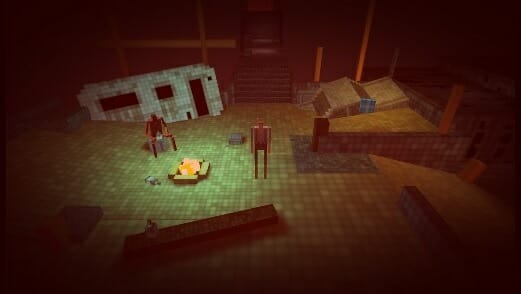
My first moment of existential dread came as a child playing Sierra’s The Black Cauldron. As part of Sierra’s modus operandi seemed to be coming up with as many grisly, gruesome and humorous deaths as possible, this seems natural in retrospect. For tiny Denis, this was a descent into horror as I led Taran, the protagonist, to his death over and over, and then realized that I too would die, though likely only the one death.
Continue?9876543210 starts off with a character’s death, a sword strapped to their back. The character is randomly selected amongst six different people upon starting. Then the screen flashes: “Continue?” with a countdown to zero. If one were to surmise this is a game about mortality, I feel they should be granted such. What follows then is a bit murkier.
Jason Oda, previously responsible for The Perfect Strangers game and Skrillex Quest, (link to that game ) describes the development as such: “Continue? was inspired by existential road trips into nowhere, Peruvian jungle drugs, and a brush with death while lost in the mountains of New Mexico.” Therefore, when he surmises that this is a love or hate it type of game, he’s not far off the mark. The game portions consist of wandering through a town, fighting square monsters in a variety of different mini-games that range from Zelda dungeon crawl to action brawler, and generally being confused.
Confusion is the aim, after all. The question Continue? poses is existential in nature, and its abstract set pieces, characters and situations really are left up for interpretation. Seeking help from townspeople consists of asking them for Lightning or Prayer, while gathering information to answer questions that will grant larger bonuses from either reward. Lightning will help clear one of three exits in a level so one can progress, Prayer will create Shelter for every third level, where the character must hide from the Garbage Collector, who is this realm’s Grim Reaper, collecting its due: the character’s life in strings of code that are severed.
Each stage is further broken out into smaller bits, with the Garbage Collector wreaking havoc either four times, once after every forty-five seconds, or twice, once after every minute. This results in another mini-game that varies greatly and either helps the player upon victory, or upon failure sets her back in her aim of self-preservation in the town whose Shelters she’s building.
My own interpretation left me seeing these as metaphors for shorter and long-term friendships that help us move from one instance of life to the next. The stages and their setups (in any one game the possibility to explore six of eleven set pieces exists) further lend themselves to interpretation. Here I am in a prison. Then there’s a town making sacrifices to a volcano. The latter had me humming Tori Amos to myself, wondering what boon I’d receive from Pele. If there is worry about it taking itself all too seriously, there is also the trailer park level, full with Juggalos and Native Americans (which makes me wonder if I am supposed to be offended, amused or merely missing some social commentary).
The game portions suffice, though none particularly appeal or draw me in for their own section particularly. There are no pieces to be taken discretely, but this to be experienced as a whole. This is what roguelikes would be if they were more focused on forcing the player to ask questions after each death, rather than constantly seeking progression. And it does force. For people who would rather just play through the sections and better their score, I am fairly certain their victory would feel hollow. Depending on how far and which paths the character goes down, the ending will leave a different sense of how things progressed.
And it can be frustrating. The difficulty is a wall that stares the player in the face; there is no tutorial, and while there is the offer of a manual to make sense of the systems and controls, it is mostly hollow as it doesn’t make sense until experienced, failed, and experienced again. Which is where this game will not appeal for many—its message and existential angst and glory (if you’ve already died, and are running from permanent non-existence, it’s about the journey, as it ever was) is wrapped in a functional but sometimes poorly presented and frustratingly difficult passage. Watching Shelters for the character’s every third stage be smashed to pieces one by one due to failure may well be a metaphor for life and watching our safety nets crumble, but it is no less bitterly agonizing as the end draws closer and closer.
That’s why I found myself squinting at those last messages to my characters (squinting because the font used is particularly atrocious for no reason I could discern). I felt no sense of victory, but I did feel a sense of closure for each. They had lived their lives poorly, efficiently, confusedly, and steadfastly. Ultimately, they all had to die, though. Were Taran from The Black Cauldron wandering these worlds, I would have led him to many more deaths, but I could now live knowing that this is part of the experience. It has to be.
Continue?9876543210 was designed by Jason Oda. It is available for PC, Mac, Linux and iOS devices.
Denis Farr is a games critic located in Chicago whose work has been featured at GayGamer, Gamers With Jobs, and Kotaku. Feel free to reach out to him at @aeazel on Twitter.
